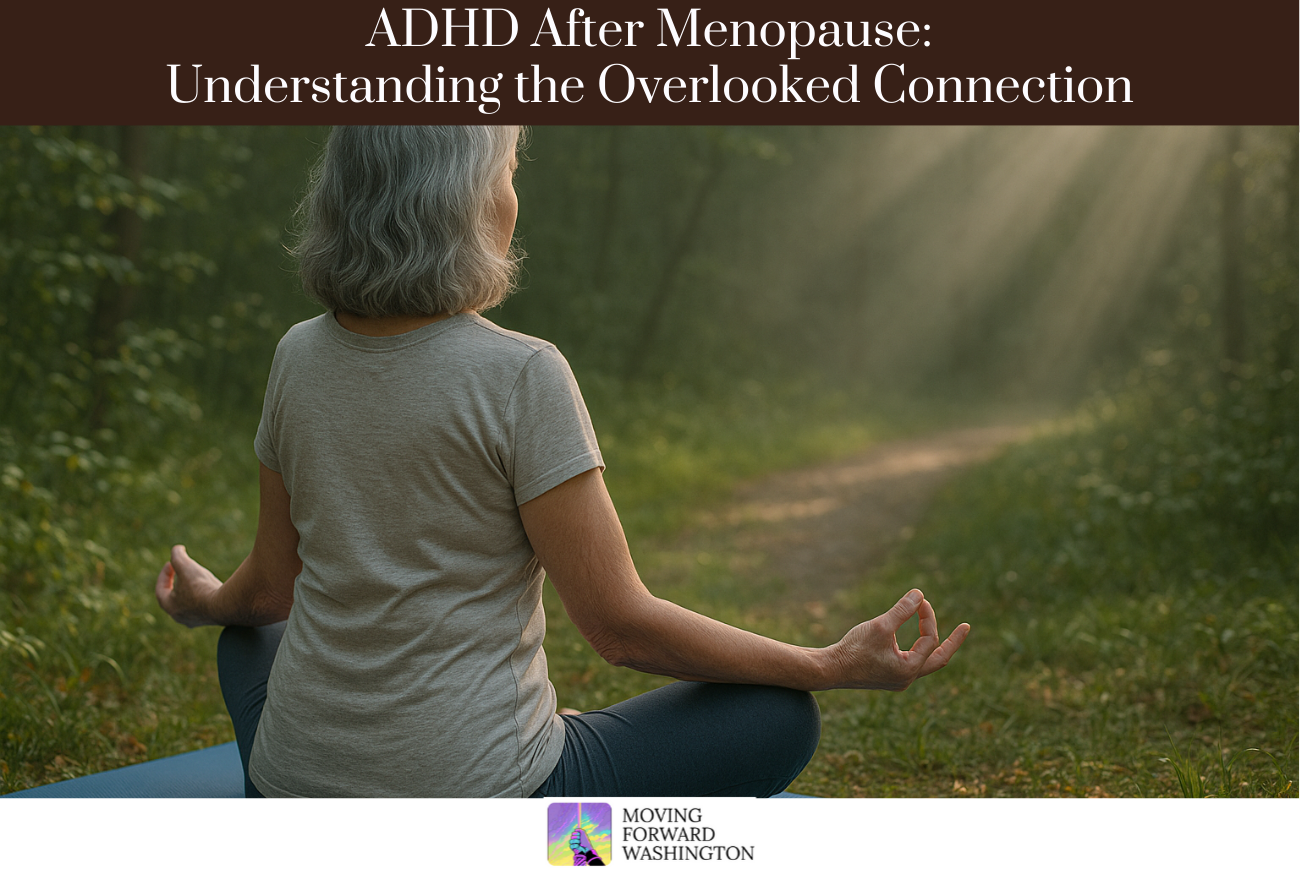Attention-Deficit/Hyperactivity Disorder (ADHD) is often associated with children and young adults, but many women continue to live with ADHD well into midlife—and some don’t even realize they have it until later. Menopause, a time of significant hormonal change, can make ADHD symptoms more noticeable, creating new challenges in focus, memory, and emotional regulation.
At Moving Forward Washington PLLC, we specialize in supporting adults who are navigating ADHD at different life stages. For women, the post-menopausal years can be particularly confusing, as overlapping symptoms of hormone decline and ADHD may be mistaken for stress, anxiety, or even early signs of dementia. Understanding these changes is the first step toward reclaiming focus, productivity, and confidence.
How Menopause Impacts ADHD
During menopause, levels of estrogen and progesterone decline. These hormones don’t just affect reproductive health—they also influence neurotransmitters such as dopamine and serotonin, which are critical in regulating mood, motivation, and attention.
For women with ADHD, this drop in hormones can:
- Increase forgetfulness and distractibility
- Heighten emotional sensitivity or irritability
- Reduce stress tolerance
- Make time management more difficult
- Intensify sleep problems, which further worsen focus
What might have felt manageable in earlier years can suddenly become overwhelming, leading many women to seek answers during this stage of life.
Support and Treatment Options
The good news is that there are effective strategies to manage ADHD symptoms after menopause:
- Comprehensive Evaluation – A mental health professional can help distinguish between ADHD, menopausal changes, and other conditions.
- Therapeutic Support – Cognitive-behavioral therapy (CBT) and ADHD coaching can improve daily routines and coping skills.
- Medication Management – Stimulant or non-stimulant ADHD medications may help regulate attention and impulsivity.
- Lifestyle Interventions – Regular exercise, good sleep hygiene, and a balanced diet support brain function.
- Mindfulness Practices – Meditation and stress-reduction techniques can improve focus and emotional balance.
Q&A: ADHD After Menopause
Q: Can ADHD appear for the first time after menopause?
A: ADHD does not begin in adulthood, but hormonal shifts may unmask previously subtle symptoms, leading women to recognize challenges for the first time.
Q: How do I know if my memory problems are from menopause or ADHD?
A: While both can cause forgetfulness, ADHD is lifelong and often includes distractibility, impulsivity, and difficulty with organization. A professional evaluation is the best way to clarify the cause.
Q: Do ADHD medications still work after menopause?
A: Yes, many women benefit from ADHD medications at this stage. Adjustments may be needed to account for changes in metabolism or other health factors.
Q: Can lifestyle changes alone help with post-menopausal ADHD symptoms?
A: Lifestyle changes can make a big difference, but they are often most effective when combined with therapy and, if appropriate, medication.
Q: Should I be worried that my symptoms are early dementia?
A: ADHD and dementia share some overlapping symptoms, but they are very different conditions. A qualified clinician can perform tests to rule out dementia and confirm whether ADHD is contributing to your challenges.
Moving Forward With ADHD Support
At Moving Forward Washington PLLC, we believe that understanding your brain is the key to living a fulfilling life. If you’re experiencing worsening ADHD symptoms after menopause—or if you’re wondering whether ADHD is part of your story—we’re here to help.
📍 Address: 1721 Hewitt Avenue, Suite 506, Everett, WA, 98201
📞 Phone: (425) 407-2771
🌐 Website: movingforwardwashington.com

